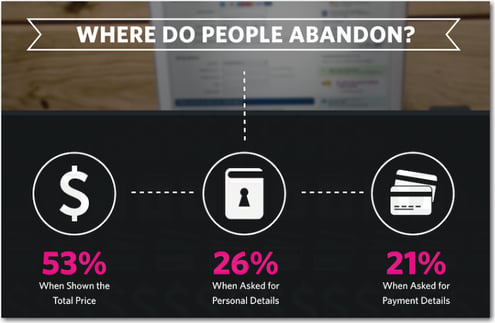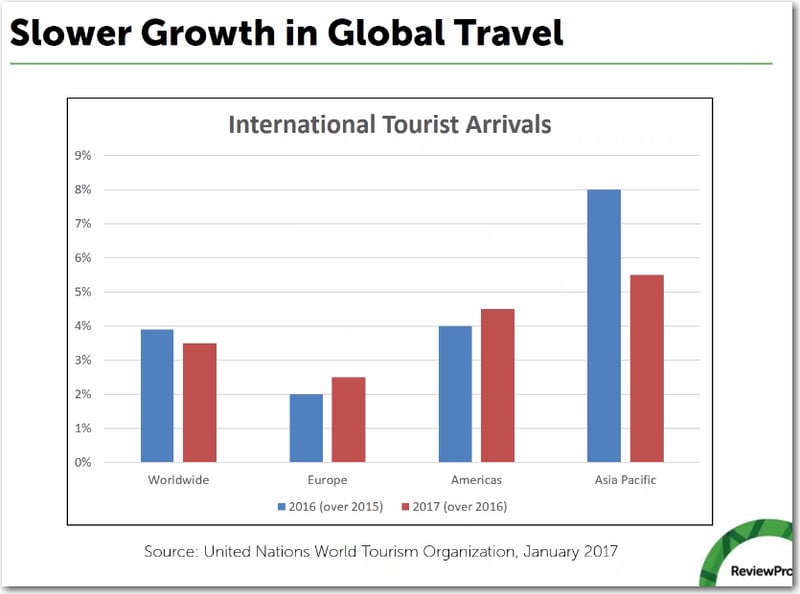Even compared to 2016’s chaos, making predictions for 2017’s revenue strategy trends has proved a challenging task! In many ways, 2016 was a year for defying logic and taking actions that would have been seen as preposterous months earlier. With any luck, 2017 will be a bit steadier.
Revenue managers’ drive to progress and develop brings optimism, possibilities and opportunities.
This benefits the travel industry at large, and certainly the hotel industry in particular. Tourism accounted for approximately 1 in every 11 jobs globally in 2016.
The key to how successful progression in revenue management will be lies in how well hotels embrace and adopt changes, and how quickly they do so.
A recent survey from Cornell of hotel revenue managers worldwide reveals that many want to look beyond the traditional focus on revenue per available room. The survey has led to really insightful feedback from industry leaders commenting on talent development, proper training, breaking down silos and use of metrics as the cornerstones to real progression and success – give it a read!
2017 is already 6 weeks old and making last year feel like a distant memory, so let’s look forward at the key revenue strategy trends shaping up for 2017. We’ve explored how those trends will impact your hotel’s revenue strategies.
The trends:
- A Continued Focus on Book Direct
- Predictive Analytics
- Mobile
- Mobile Payments
- Online Reputation & Brand Advocacy
- Underestimating the Competition
- Chat Apps
- External Factors
1. A Continued Focus on Book Direct
The Book Direct trend will continue for 2017, with an increased focus on loyalty and advocacy.
In 2016, ‘book direct’ became a bigger part of the conversation, with large brands like Hilton, Marriott, InterContinental, and others rolling out robust campaigns to grab consumer attention.
In 2017, the trend of focusing on clear and tangible reasons to book directly on the hotels website will continue.
However, there will be a few changes in approach as hotels take on board lessons from the past 12 months:
- 2017 will be a pivotal year. We will get a clearer picture of how the continued offering of lower rates to ‘loyalty’ guests works out. There have been grumblings that all is not rosy with these particular brand book direct schemes. Are high marketing costs and discount prices sustainable?
- Relationships with OTA’s are swinging towards reconciliatory. Hotels will need to accept that travellers are still going to use OTA’s. They offer a huge value to guests, and it’s not a case of either direct or OTA. Instead, hotels must try to emphasize their own value, both to guests and in their relationship with OTA’s.
- Recognize that hotels and OTA’s currently do both need each other. Hotels must weigh the balance of power in their own direction. More challengingly, they must maintain it.
- In terms of incentivising the guest to book direct, there’s no point throwing the kitchen sink at it! You are eroding your bottom line, and, past a certain point, giving the guest multiple items to process and value will only add confusion.
- Hotels will seek to really promote a value add item, instead of purely working on a discount approach. With so many hotels promoting a book direct message, a value add item is the only way to avoid eroding your bottom line to unsustainable levels.
- Your hotel’s unique reason to book on the hotel website should be clearly presented, easily understood, and of genuine tangible value to the guest.
- Use the reasons to book to incentivise guests to opt into your loyalty scheme. This works to ensure the guest stays not just once, but returns in the future.
- For your active, loyal guests, 2017 will be a year of actively encouraging them to become brand ambassadors. There are technology providers you can partner with to achieve this – here’s one.
2. Predictive Analytics

We’re predicting an increased adoption of predictive analytics tools.
Predictive analytics, no matter how you look at it, is the future of revenue management. Although predictive analytics itself is not new, the volume of data, the reliability, and its real time nature are.
Current research by Dr. Lalia Rach for the Hospitality Sales and Marketing Association International suggests that predictive analytics now underlies all of revenue management. “At most hotel companies, revenue management has evolved from just a rate-setting function to a strategic discipline that relies on predictive analytics to guide the entire enterprise’s quest for increased profitability,” the study concludes.
Revenue strategy decisions are evolving, and becoming based on data and current activity rather than historic trends or past performance.
However, with just 6% of European Hotels and 10% of USA hotels using a revenue management system, it’s a pretty low adoption rate with quite some way to go.
In terms of the available technology, it would appear Expedia are aiming to make the most of this low rate with their Rev+ Tool.
Why Isn’t Everyone Using It Already?
What’s getting in the way? Many hotels struggle with internal power struggles, with general managers occasionally overruling data-driven decisions with old rules of thumb (e.g. ‘Take last year’s numbers and add 2%’).
Although so much of the talk and focus in recent revenue management articles centres on data, this masks the reality for many hotels. It looks like hotels outside of larger chains aren’t keen on either investing in the technology or adapting their working approach. A combination of factors are likely causing this:
- Barriers to investment (e.g. price, time to train employees)
- Lack of product knowledge
- An under-estimation of the benefits
- Sharing data with departments
It will be interesting to see how the number of hotels using a revenue manage system changes in 2017 – or doesn’t!
3. Mobile
Mobile is now the core traffic platform. Hoteliers and others in the m-commerce space must focus on how products are displayed and mobile user experience. Adoption & acceptance of new methods of payment are needed.
We have all seen the growth in mobile transactions over the past year. In most cases, it is now the largest source of traffic when looked at by device. Our own clients saw a 54% growth in transactions taking place on mobile devices this year. Mobile is no longer a consideration – it’s the first platform to look at.
From a revenue perspective, this means being acutely aware of how the product displays at a mobile level and how good the user experience is. Be aware that a user will not interact with your website in the same way at desktop and mobile levels. Here’s a good summary of core items to optimise for mobile UX.
For hotels in particular, how positive is the booking process experience, and what stages may cause friction for users? Consider:
- Forms: Small fields cause trouble on mobile. Also, if there’s too much data to fill in, they get very cumbersome very quickly
- Payment: Users require reassurance on security – it’s one of the major hurdles to overcome
Here’s a good overview on what to look out for in the booking process from UX matters.
All this means being educated on the importance of UX at a mobile level. You must be able to confidently assure the powers that be that real and continual investment in mobile platform is a must. and to be aware of what you want from your mobile site.
4. Mobile Payments

In 2017, the payment process comes into sharp focus at the mobile level.
At some point, the user is going to have to guarantee their booking. While this can take many shapes and forms, hotels tend to be fairly rigid on this being a credit card number. Why not? After all, it’s the way it has always been done.
There are a few reasons to move past the credit card – one of them is your bottom line.
Payments on mobile are moving past the credit card, opening the doorway for mobile conversions to finally catch up with mobile traffic. From Paypal, Google Wallet, Apple Pay and Paytm, innovative payment methods are making mobile bookings easier.
Some predictors go as far as speculating that, within the next five years, half of today’s smartphone users will use mobile payments as their preferred method of payment
This may be overly optimistic, considering that there is some way to go before consumers fully accept and adopt these payment methods.
Recently, a Gallup study found that only 13% of US adults have a digital wallet app on their smartphone. Primary barriers to adoption mentioned were security, lack of knowledge and no perceived benefits – those aren’t problems to take lightly.
The barriers to adoption should be expected. Mobile wallets will see greater adoption with a younger audience and, in time, usage will filter through to the greater majority.
5. Online Reputation & Brand Advocacy
Brand advocacy leverages the power of positive reviews further.
The link between positive quality of reviews, review rankings and the consumer’s decision to stay with the hotel cannot be taken lightly. In terms of the leisure guest, it’s widely recognised that reviews are critical in the decision process. You can have the best price in town, but if the reviews are bad, the leisure guest will go elsewhere.
On the other hand, studies show that prospective guests will prioritize positive reviews in their decision – even over price.
What else really matters, as long as you’re getting those reviews? It is the way your hotels use these reviews that matters. This is called brand advocacy. Hootsuite defines it as the practice of leveraging peer-to-peer recommendations to grow brand awareness and develop strong customer loyalties.
It is not enough to proactively manage reviews. To start with, your positive reviews need to be visible on your hotel website. To reassure guests and persuade them to continue with the booking, showcase reviews to act as a sales tool to help convert bookings.
The Role of Social Media
Social media enables hotels to hone in on their best, most vocal advocates, and then leverage their opinion further.
The influence of peer opinions on social media are very valuable, and can help create a base of loyal guests. According to Hootsuite, 92% of consumers trust brand advocates, and 9 out of 10 say recommendations from friends and family members are their most trusted form of advertising.
Always encourage guests to share their experience, at all the various stages of their trip. Encourage them to share their booking, share photos, and to share a review of their stay after they get back home.
To persuade guests to be vocal, provide an incentive.
For example, you can reward friends with a discount when they share, reward the guest with a discount for their next stay, or give them an add on to their upcoming booking.
6. Underestimating the Competition
Perhaps it is the hotel industry’s sunny disposition that has lead us to under-estimate competition in its various forms. However, it’s time for that to change – there are big players making big moves, and it’s bound to affect our hotels and revenue strategy sooner rather than later.
Expedia
A few short years ago, many hotels were bound to Expedia contracts, and trying their best to get out of allocation agreements! Today, though, Booking.com is typically at the centre of attention.
Expedia is coming back strongly to centre stage, however. Hotels and news outlets are commenting on Expedia growth. Together, a more profitable relationship is being attempted: hotels are taking a more proactive approach, and Expedia is positioning itself as the “friendly” partner for hotels.
Furthermore, Expedia’s Rev+ is being touted as a product designed and developed with hoteliers, for hoteliers, and it’s free. Nothing is free in the long term, though.
We’ve been through this a few times before, so be warned!
Airbnb
Many hoteliers are quick to scoff at the idea that Airbnb will significantly impact their business. The traditional thinking is that travellers prefer the experience of their hotel. They want to be in the heart of things.
Airbnb, however, has expanded the available options. They change the mindset of travellers in terms of what accommodation is possible. Their platform offers that ‘unique stay,’ and we all seem to want that unique vacation. When you’ve seen 20 friends in the last year posting pictures from the same stretch of Spanish beach, the lure of something a bit different is powerful.
In a straight comparison between the accommodation types on offer on Airbnb for your local area, you may scoff that those offers pale in comparison to your property.
One line of argument is that Airbnb isn’t infringing hugely on the traditional hotel market. Instead, it’s opened a ‘shadow market’ of previously untapped potential. Many Airbnb users, the argument goes, wouldn’t be travelling at all if it weren’t for Airbnb’s price points and their unique offerings. So, they conclude, hotels aren’t losing business. At least, not much.
Don’t be so quick to dismiss the longer term impact of the so-called sharing market. Instead, appeal to those ‘experience seekers’ on your own site.
You know your property best, and you know its best features. Be sure the unique qualities of your hotel, along with its comforts and amenities, are highly visible on the website. Let the user easily see why your hotel is the better choice!
How could you possibly underestimate Google, you ask? Precisely because they have so much control over the market,  it’s easy to take that power for
it’s easy to take that power for
granted. Stay aware, though! Be mindful of how much control has been given over to one corporation. They control:
- Search results rankings
- Which adverting formats are deemed acceptable – consider restrictions on floating banners, etc.
- Mobile rankings
- What’s deemed as secure
- How people find hotels
- How people find anything!
- What we pay for traffic, in large part
There are suggestions that Google will in time become an OTA. However, when you look at what they already control, wouldn’t being an be something of a downgrade for them? Additionally, there would be uncountable issues with competitive conflicts.
Keep an eye on your competitors! Some of them aren’t who you’d expect, and you must look beyond your local competitor set when developing your revenue strategy.
7. Chat Apps
Chat apps are one of the latest ways people engage in conversation.
Generally speaking, we are not terribly keen on actually talking to people. Email was the original high-speed saviour for this, but we are demanding faster satisfaction than ever. WhatsApp, Facebook Messenger and good old-fashioned texting are filling that gap.
Guests want to communicate with hotels in the same way we communicate with everyone else. Chat apps are the answer.
One option is to ‘go native’ and develop an in house system. Another option is to look at Facebook, WhatsApp and others. Chains have been quicker to adopt chat app technology.
For example, since Starwood commenced trialling WhatsApp 2 years ago, the program has expanded to 175 properties throughout the EAME, with the standard of receiving a response 24/7 and within 60 seconds! Here’s a good piece from Skift on hotels using messaging to connect with guests.
Chat apps are no doubt on the rise, and the challenge lies in seeing how they can monetise interactions without becoming ‘spam.’ Additionally, marketers will need to learn how to track effectively which chats result in a booking or ad on at a later point. Without effective tracking, it will be difficult to learn how chat apps should factor into a revenue strategy.
Chat apps look set to become core to a powerful customer service tool that builds loyalty, engagement and the overall guest experience.
Bear in mind some pitfalls of using a chat app:
- Increase in customer support resources
- Issues trying to priorities all support items, as channels like Facebook require immediate response
- It makes people lazy by encouraging them to ask questions whose answers are already on the website
- It can degrade the customer experience if you don’t manage it properly
8. External Factors
Although not an item you can control, external factors are having a greater an impact on bookings and revenue strategy than ever. Continued fear of terrorism, a weakened sterling and the new presidential administration in USA all change how and where people will travel to. There’s also the importance of the emerging markets, including China, India and Brazil.
Some traditionally strong geographic markets need to be monitored closely for change. Work on alternatives to ensure you’re not over-exposed in a market that’s in decline.
A recent webinar from Review Pro referenced growth forecasts for 2017 from United Nations World Tourism Organisation. Worldwide, they’re predicting just over 3% growth, compared to almost 4% in 2016. They predict 2.5% growth for Europe, in an increase from 2% in 2016.

Our own results show UK bookings have continued to grow for January 2017, with approximately 18% growth.
At first look, it appears that the weaker sterling is not having a negative impact. However, Northern Ireland bookings have had significantly slower growth at just 2%. This may indicate the sterling is having more impact on a leisure market. USA bookings have also seen growth for the first month of the year.
We’ll be watching closely for any changes in patterns!
Conclusion
As always, a trends list puts forward many changes to come. How far will these revenue strategy items progress over the 12 months? As we’ve all witnessed, it can take time for changes to take hold in the hotel industry!
Funding and belief may be the stumbling blocks stopping the use of predictive analytics in the short term.
Mobile is already here – it’s just a matter of how well hotels and the industry at large adopt ways to shop and pay on our phones.
Reputation has always been a critical evaluator in all our lives – not just business! What is changing is how hotels promote their reputation and empower their positive reviewers to become true brand advocates.
Tech advances are boundless, and the ways hotels embrace advancements for practical and positive use is key. Chat bots may take time to perfect, but they are a valuable way for hotels to engage with their guests on the platforms they’re most comfortable with.
In reality, of course, none of us can really predict the future. Looking back on the past 12 months of global upheaval, the saying “anything that can happen, will” rings truer than ever! So, to keep our best foot forward, plan ahead and keep evaluating what’s happening. Don’t just look at events on your doorstop – try to take in the whole landscape.



